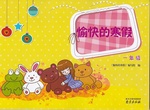题目内容
环保话题是人们最关心的话题之一,请以Change for a better China为主题,结合自己家乡的变化写一篇英语短文。
注意事项:
1.短文应包括表格中的所有提示内容,条理清楚,作适当发挥。
2.短文中不能出现真实的人名和地名,词数不少于80。
状况 | 水污染,大气污染...... |
应对措施 | 立即阻止此类活动,治理环境(至少两条)...... |
感想建议 | 环境能够变得更好...... |
Change for a better China
____________________________________________________________________________
____________________________________________________________________________
练习册系列答案
 愉快的寒假南京出版社系列答案
愉快的寒假南京出版社系列答案
相关题目

